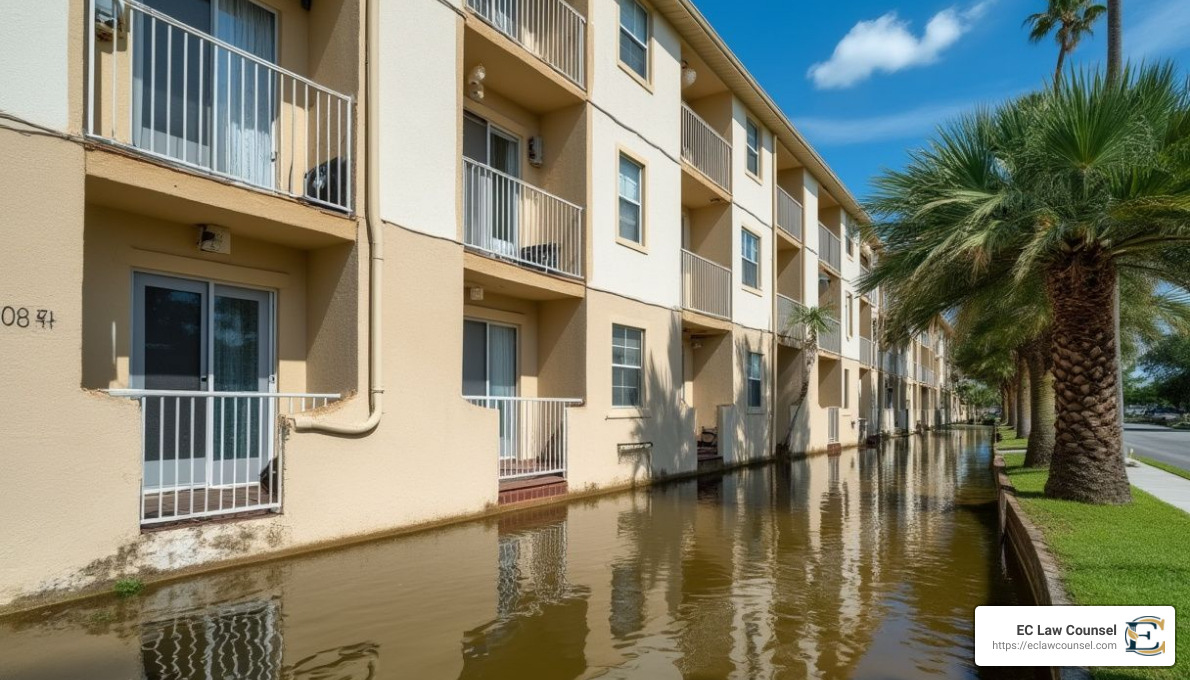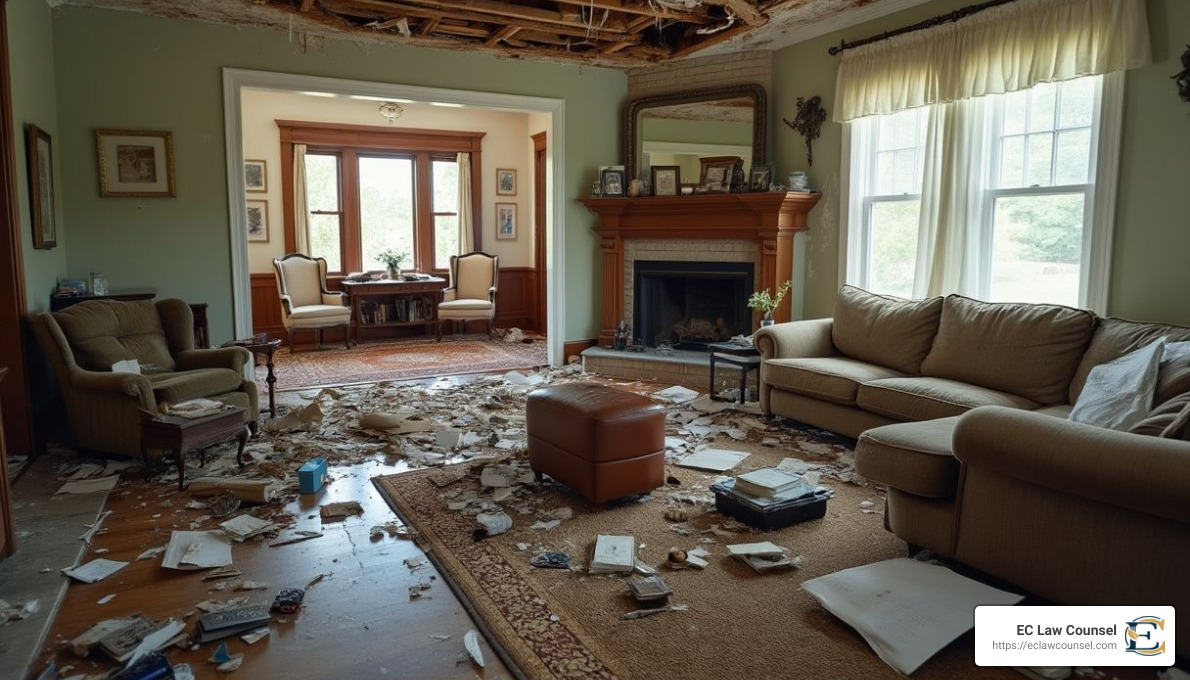When a hurricane hits, the damage it leaves in its wake can be overwhelming. In the aftermath, finding a hurricane damage lawyer might be your top priority to ensure you receive the insurance compensation you deserve. Here’s a quick rundown to help you get started:
- Understand your insurance policy and what it covers
- Document the damage thoroughly with photos and lists
- Research lawyers with experience in hurricane damage claims
- Schedule consultations for personalized advice
- Evaluate communication skills and transparency of potential lawyers
Hurricane damage impacts not just your home but also your peace of mind. Navigating insurance claims can be stressful, especially when your insurer delays or denies payment. A knowledgeable hurricane damage lawyer can guide you through the process, offering legal representation to maximize your claim recovery.

Understand Your Insurance Policy
When dealing with hurricane damage, understanding your insurance policy is crucial. It helps you know what’s covered and what isn’t, so you can make informed decisions and avoid surprises.
Policy Coverage
First, review your policy to see what types of damage it covers. Most standard homeowners insurance policies cover wind damage but do not include flood damage. This distinction is important because hurricanes often bring both wind and flooding.
Deductible
Next, check your deductible. This is the amount you must pay out-of-pocket before your insurance kicks in. For hurricane damage, the deductible might be higher than for other types of claims. Knowing this amount helps you plan financially if you need to file a claim.
Flood Insurance
Since most standard policies exclude flood damage, you might need separate flood insurance. You can obtain this through the National Flood Insurance Program (NFIP) or a private insurer. Flood insurance is essential, especially if you live in a high-risk area, as flooding can cause extensive damage not covered by regular homeowners insurance.

Anti-Concurrent Clauses
Some policies have anti-concurrent clauses. These clauses can deny coverage if both a covered and non-covered event cause damage at the same time. For example, if wind (covered) and flood (non-covered) damage occur together, your claim might be denied. Understanding these clauses can help you prepare for potential disputes with your insurer.
Replacement Cost vs. Actual Cash Value
Finally, know whether your policy pays out based on Replacement Cost Coverage (RCC) or Actual Cash Value (ACV). RCC provides funds to replace damaged property with similar materials without depreciation. ACV accounts for depreciation, often resulting in lower payouts. RCC is generally preferred as it helps you rebuild without financial strain.
By understanding these elements of your insurance policy, you can better steer the claims process and ensure you’re adequately protected. If you’re unsure about any details, consider consulting a hurricane damage lawyer for guidance.
Document the Damage
When a hurricane hits, documenting the damage is a critical step in filing a successful insurance claim. Here’s how to do it effectively:
Take Photographs
Start by taking clear, comprehensive photographs of all the damage. Aim to capture every angle of your home, including the roof, walls, and any outdoor structures like sheds or fences.
- Wide Shots: Begin with wide shots to show the overall extent of the damage.
- Close-Ups: Follow up with close-ups of specific issues, like broken windows, roof shingles, or water-damaged interiors.
These images will serve as visual evidence, helping to substantiate your claim and showing the condition of your property after the storm.
Create an Itemized List
Next, make an itemized list of all damaged items. This list should include:
- Personal Property: Note down furniture, electronics, and other personal belongings that have been damaged.
- Structural Damage: Include details about damaged parts of your home, such as the roof, windows, or walls.
For each item, note its condition before the hurricane, the extent of the damage, and an estimated value. This detailed list will be invaluable when negotiating with your insurance adjuster.
Obtain Repair Estimates
Finally, gather repair estimates from licensed contractors. These estimates should cover:
- Structural Repairs: Costs to fix or replace damaged parts of your home.
- Personal Property Replacement: Costs to replace or repair personal items.
Having multiple estimates can provide a more accurate picture of the repair costs and help ensure you receive a fair settlement from your insurer.
By thoroughly documenting the damage with photographs, an itemized list, and repair estimates, you’ll be well-prepared to file a comprehensive and persuasive insurance claim. This preparation can make a significant difference in the outcome of your claim.

Next, we’ll explore how to research potential lawyers to assist you in navigating the complexities of hurricane damage claims.
Research Potential Lawyers
Finding the right hurricane damage lawyer can make a huge difference in successfully navigating your insurance claim. Here’s how to research potential lawyers effectively:
Check Their Track Record
Start by looking at the lawyer’s past successes. A strong track record can indicate how well they handle hurricane damage claims. Look for:
- Successful Settlements: See if they have secured significant settlements for past clients.
- Experience with Similar Cases: Ensure they have handled cases similar to yours, especially involving hurricane damage.
A lawyer with a proven history can provide confidence that they understand the complexities of these claims.
Read Client Reviews
Client reviews provide insight into a lawyer’s reputation and performance. Look for:
- Positive Feedback: Seek reviews that mention successful outcomes and client satisfaction.
- Communication Skills: Notice if clients highlight how well the lawyer communicated and kept them informed.
Reviews can reveal a lot about a lawyer’s dedication and ability to handle your case effectively.
Understand Their Legal Procedures
Each lawyer may handle cases differently. It’s important to understand their approach to legal procedures, which can include:
- Case Evaluation: How they assess your case and determine the best strategy.
- Negotiation Tactics: Their methods for negotiating with insurance companies.
Knowing their procedures can help you decide if their approach aligns with your needs and expectations.
By focusing on a lawyer’s track record, client reviews, and their approach to legal procedures, you can make an informed decision on who to trust with your hurricane damage claim.
Next, we’ll discuss how to schedule consultations to find the best legal representation for your situation.
Schedule Consultations
Once you have a shortlist of potential hurricane damage lawyers, the next step is to schedule consultations. This is your chance to get a feel for how they operate and if they’re the right fit for your case.
Free Consultation
Most lawyers offer a free consultation to discuss your situation. This is a great opportunity to:
- Ask Questions: Prepare a list of questions about their experience, approach, and fees.
- Understand Their Process: Find out how they plan to handle your case and what steps they will take.
A free consultation allows you to gauge their interest in your case and their willingness to help.
Case Evaluation
During the consultation, the lawyer will typically conduct a case evaluation. This involves:
- Assessing Your Claim: They will review the details of your situation, including any documentation you’ve gathered.
- Providing Initial Advice: You’ll receive preliminary insights into the strength of your claim and possible outcomes.
A thorough case evaluation can help you understand the potential complexities and challenges of your claim.
Legal Advice
Take advantage of the legal advice offered during your consultation. This includes:
- Understanding Your Rights: Learn about your rights under your insurance policy and how they apply to your case.
- Next Steps: Get advice on the immediate actions you should take to strengthen your claim.
The consultation is not just about the lawyer evaluating your case, but also about you evaluating the lawyer. Use this time to ensure they communicate clearly and show genuine interest in helping you.
After consultations, you will be better equipped to choose the lawyer who best meets your needs. Next, we’ll explore how to evaluate communication and transparency in your potential legal representation.
Evaluate Communication and Transparency
Once you’ve had consultations with potential hurricane damage lawyers, it’s crucial to evaluate how well they communicate and how transparent they are about their process. These factors can significantly impact your experience and the outcome of your case.
Clear Process
A good lawyer should outline a clear process for handling your claim. This means they should:
- Explain Each Step: You should know what to expect at every stage of the legal process, from filing the claim to negotiating with the insurance company.
- Provide a Timeline: While exact timelines can vary, having a general idea of how long each step might take is helpful.
Understanding the process helps you feel more in control and reduces anxiety about the unknown.
Client Updates
Regular client updates are essential for keeping you informed about your case’s progress. Look for lawyers who:
- Communicate Regularly: They should provide updates at key points and inform you of any changes in your case.
- Use Clear Language: Legal jargon can be confusing, so it’s important that they explain things in simple terms.
Consistent updates ensure you are always aware of what’s happening and can make informed decisions.
Negotiation Skills
Negotiation skills are vital in securing the best possible outcome for your claim. A lawyer with strong negotiation skills will:
- Advocate Effectively: They should be able to present your case convincingly to the insurance company.
- Seek Fair Compensation: Their goal should be to maximize your claim amount based on the documented damage.
Effective negotiation can make a significant difference in the compensation you receive.
Evaluating these aspects will help you choose a lawyer who not only has the legal knowledge but also the communication skills necessary for a successful claim. Next, we’ll address some frequently asked questions about hurricane damage lawyers to further guide you in this process.
Frequently Asked Questions about Hurricane Damage Lawyers
Do insurance companies pay for hurricane damage?
Insurance companies may cover hurricane damage, but it depends on your policy. Windstorm coverage is usually part of a standard homeowners policy and covers damage from high winds, like those from a hurricane. However, flood damage is often excluded. For flood coverage, you might need a separate policy from the National Flood Insurance Program or a private insurer. It’s crucial to check your policy details to understand what is and isn’t covered.
How long does an insurance company have to settle a hurricane claim in Florida?
In Florida, insurance companies have specific timelines to settle hurricane claims. Typically, they must acknowledge receipt of a claim within 14 days and make a decision within 90 days. However, actual payment timelines can vary based on the complexity of the claim and the extent of the damage. It’s important to keep track of these deadlines to ensure your claim is processed timely.
What happens if your house is damaged in a hurricane?
If your house is damaged in a hurricane, the first step is to file an insurance claim. Document the damage with photos and videos, and list all damaged items. If your insurance doesn’t cover all the damage, you might be eligible for government aid. Programs like FEMA can offer assistance to help with repairs and living expenses. It’s essential to explore all your options to cover the costs of rebuilding and recovery.
Conclusion
Navigating the aftermath of a hurricane can be overwhelming, especially when dealing with insurance claims. This is where EC Law Counsel steps in to make a difference. Our team, with a background as former insurance adjusters and underwriters, knows the ins and outs of the insurance industry. This unique experience allows us to effectively handle your hurricane damage claims.
We understand the tactics insurance companies might use to delay or deny your rightful compensation. Our goal is to secure the settlements you deserve without unnecessary delays. With our knowledge of policy intricacies and claim procedures, we ensure that your case is handled with the utmost care and precision.
At EC Law Counsel, we focus on clear communication and transparency throughout the process. We keep you informed at every stage, ensuring you understand each step and feel confident in the decisions being made. Our commitment is to help you rebuild and recover as quickly as possible, providing you with peace of mind during a challenging time.
If you’re facing problems with your insurance claim, you don’t have to steer this alone. Reach out to us for a consultation and let us help you move forward with confidence.





